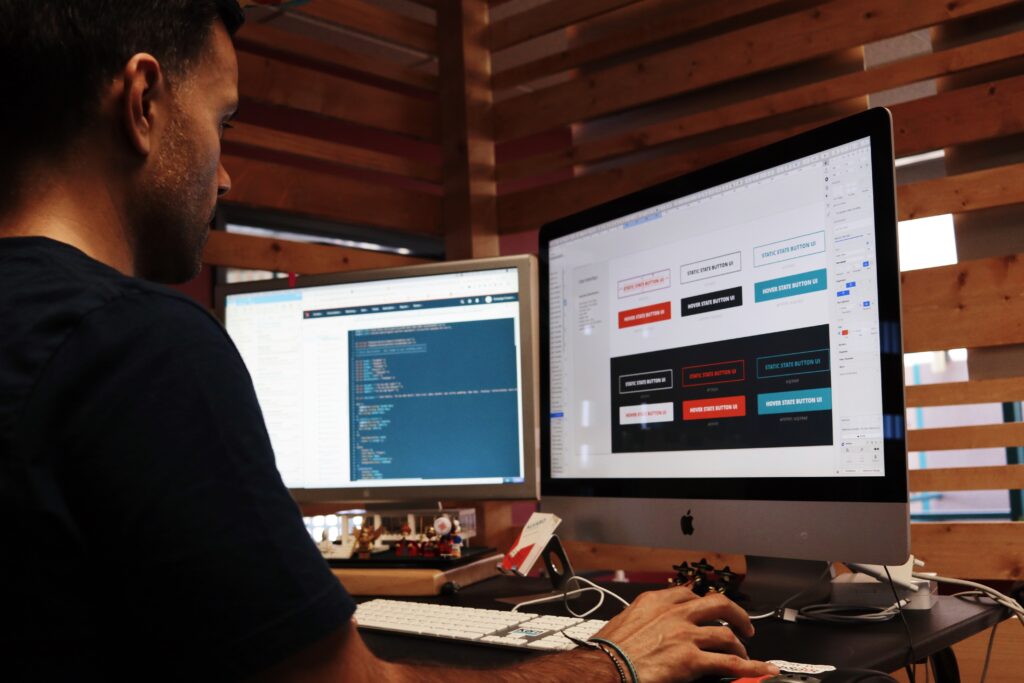Software Engineering: Hard vs. Soft Skills
- 05 Sep 2023
- 7 min read
It’s one thing to be a talented engineer. It’s another to be a talented engineer who can work well with a team and communicate their ideas to untrained coworkers.
Becoming a professional in any industry requires a healthy combination of technical knowledge and social skills. Technical knowledge is commonly referred to as hard skills, while the interpersonal attributes associated with collaborative work are referred to as soft skills.
Honing and maintaining both hard and soft skills is essential to a long, successful, fruitful career in industries like software engineering and beyond. This article will break down both the hard and soft skills associated with software engineering to illustrate the importance of learning them simultaneously.
If you’re interested in pursuing a career in software engineering, ALX Africa offers both an Introduction to Software Engineering programme, as well as a Software Engineering Plus programme for learners of all skill levels.

Hard Skills of a Software Engineer
Hard skills in any industry refer to the techniques, abilities, and skill sets that someone has that are learned and can be demonstrated in a measured way. The simplest way to understand what is a hard skill is something that you can learn and improve on through practice. Teachable, measurable abilities like reading, writing, coding, or math fall into this category.
For software engineers, there are many specific hard skills that you must possess in order to be hired and excel in your field. These skills help software engineers navigate the dynamic and complex tech landscape they inhabit, while being the mechanism for their ability to innovate effectively.
Hard skills help software engineers develop robust and efficient software solutions. Without them, they could not be considered software engineers at all.
Some of the key skills that every software engineer should possess include the following:
- Programming languages: In order to code, you must be proficient in several programming languages, including Python, Java, C++, and JavaScript. With these languages, software engineers can build and run complex algorithms and parse through large sets of data.
- Data structures and algorithms: Data structures refer to the organisation of data in a virtual system, while algorithms are steps that a computer executes in order to transform an input into a target output. These functions are used by software engineers to build computer programs with optimised, efficient code.
- Software development methodologies: By using methodologies like Scrum or Kanban, software engineers can follow a structured process to help them effectively work through a programming obstacle.
- Web development: Mastery of coding languages like HTML, CSS, and JavaScript allow software engineers to develop websites for various purposes.
- Database management: With proficiency in SQL or NoSQL, software engineers can handle large sets of data effectively.
- Version control systems: This category of software tools helps record changes a software engineer makes in the code of a specific file to keep track of the different versions of a file an engineer is working with.
- Testing and debugging: A software engineer should know how to write comprehensive test cases and to resolve software issues as they come up.
- System architecture and design: Here, architecture refers to the blueprint for a system. Software engineers must be able to define structured solutions to meet technical and operational requirements of a system.

Soft Skills Matter, Too
While technical skills are crucial for software engineers to do their jobs properly, the development of soft skills are just as important. In highly-collaborative roles like software engineering, hard skills and soft skills tend to complement each other.
Soft skills are interpersonal skills and character traits that revolve around someone’s relationships with others. They are less focused on what a person knows, and more focused on who they are.
Some examples of soft skills that are useful for software engineers include:
- Problem-solving: Learning to think analytically helps software engineers come up with innovative solutions in software and beyond.
- Effective communication: Software engineers will often have to convey highly-technical concepts to people without any technical knowledge. Knowing how to do so clearly and effectively is an important skill that is useful in any industry.
- Adaptability & flexibility: Technology changes all the time. It is therefore essential for software engineers to become adaptable and willing to embrace change quickly.
- Teamwork & collaboration: A software engineer typically is one part of a much bigger team. In order to make sure everything works together, they must work in tandem with other departments and learn to value diverse perspectives with good lines of communication.
- Time management & organisation: Software engineering usually involves juggling multiple projects and tasks at once. Learning to efficiently manage projects, meet deadlines, and prioritise tasks is a vital soft skill you will inevitably learn.
- Attention to detail: Writing code and developing software usually means meticulous testing and debugging to make sure it functions properly. In order for your work to be reliable and accurate, you must have a strong attention to detail.
- Emotional intelligence: As you will likely be working with a team, you must be able to navigate conflicts, resolve issues, and maintain positive relationships with your coworkers.
- Continuous learning: Working in tech means keeping up with its rapid pace of advancement. You will naturally learn as a software engineer how to stay up-to-date with emerging trends, committing yourself to lifelong learning.

By mastering key soft skills, you can, ideally, collaborate effectively with others, easily adapt to changing dynamics, and thrive in diverse work environments. When you combine soft skills with technical expertise, software engineers are best set up for success in their careers.
Summary
Learning software engineering is much more than just perfecting technical skills. Though those hard skills are essential to becoming a successful software engineer, there are a multitude of soft skills that are equally as important to master.
By combining both hard and soft skills, you can set yourself up for future success as a capable software engineer who is technically talented, with interpersonal skills to match.
ALX Africa offers software engineering programmes that focus on teaching learners both hard and soft skills together. Sign up for our Software Engineering Plus programme today and get a head start on becoming a tech professional.
FAQs
1. What are some hard skills software engineers learn?
Hard skills software engineers learn include: programming languages like Python, Java, C++, and JavaScript; understanding data structures and algorithms for efficient problem-solving; knowledge of software development methodologies; mastery of web development techniques including HTML, CSS, and JavaScript frameworks; competence in database management using SQL or NoSQL; proficiency in version control systems like Git; skill testing and debugging software.
2. What are some soft skills software engineers learn?
Software engineers learn to be proficient problem-solvers and communicators. They know how to convey technical concepts and collaborate with diverse stakeholders to get their point across. They are adaptable and flexible, always embracing change and learning new technologies.
Other soft skills include teamwork and collaboration to contribute effectively in a team environment, time management, and organisation to efficiently manage projects and meet deadlines, attention to detail for accurate testing and debugging, continuous learning to stay updated with emerging trends, and emotional intelligence to navigate conflicts and foster positive relationships.
3. Is coding a soft or hard skill?
Coding is considered a hard skill. It is a technical discipline with specific rules and procedures that you can learn and improve upon as time goes on. An example of a soft skill would be your ability to communicate complex code to an untrained person on your team.
